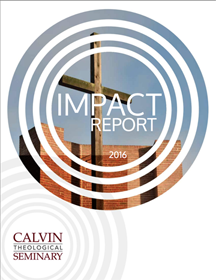Report Shows Seminary’s 'Impact'

As a student at Calvin Theological Seminary, Christianne Zeiger completed her cross-cultural internship last year by serving at Casa Bethel Church in the Philippines.
“I was thrust into a Filipino Christianity which was absolutely passionate about evangelism and preaching outside the church,” she recounts of her internship in the seminary’s annual Impact Report, which highlights various developments and events from the previous year.
“Preaching in America is typically a once-a-week event. Filipino pastors preach every day,” Zeiger said.
Also in the annual report, student Andrea Bult reflects on her cross-cultural internship as a chaplain at nursing homes through Baruch Senior Ministries in the United States. She found that elderly residents often asked her tough questions that challenged everything she knew.
They asked such things as “Is my husband in heaven or the grave until Jesus returns?” Or “Was it God or evil that allowed my children to die in a car accident?” And “Where exactly is my wife now that she can’t talk or eat or recognize me?”
Seminary student Matthew Slack also recalls his cross-cultural internship among people in poverty in London, England, at the London City Mission.
“My time in London wasn’t characterized by remarkable conversions or romantic experiences or Sinaiesque happenings,” he writes. “It had mostly to do with serving people with tea and food and attention.”
In all, 2016 was a busy and fruitful year, in which 466 students studied in Calvin Theological Seminary’s various programs and 67 faculty and staff served.
Here are some of the other happenings:
With the help of a Faculty Heritage Grant, John Bolt, the Jean and Kenneth Baker Professor of Systematic Theology, met in July 2016 to consult with an editorial team involved in translating the three volumes of Herman Bavinck’s Reformed Ethics, scheduled for publication in 2019.
“We opened each day with devotions led by members of the team, ate meals together, shared life and faith stories and experiences, and blessed each other as fellow followers of Jesus Christ,” said Bolt.
Matt Tuininga, professor of moral theology, requested funds in 2016 to have his new book, Calvin’s Political Theology and the Public Engagement of the Church, professionally indexed. For a book such as this, a well-constructed index is crucial, and this is not something that publishers normally include in their contracts with authors.
“The book explores the history and biblical roots of Calvin’s political theology, and then offers a constructive proposal for how that political theology might serve to guide the church in its public engagement today,” said Tuininga.
Mariano Avila, professor of New Testament at the seminary, used grant funding to research and connect with programs that are similar to the seminary’s Certificate in Hispanic Ministry, which he helped to develop.
“My research will contribute with the systematization of previous experiences and publications and also will offer a new model that promises to be unique and innovative for the theological formation of Hispanic leaders in the U.S.,” he said.
Meanwhile, in April 2016, Professor Arie Leder gave his “Last Lecture,” marking the beginning of his retirement after 29 years as a professor of Old Testament. After the lecture, Arie’s brother, John, announced a new endowed seminary chair supported by the Leder Charitable Foundation: The Arie C. and Olga H. Leder Chair in Bible and Missions.
The seminary also held an event at which it launched the new Legacy Award, “designed to recognize and cultivate philanthropic and charitable giving from one generation to the next.”
The award was given to members of the Gary and Matilda Vermeer family and the Harry and Bernice Vermeer family, as well as to directors and officers of the Vermeer Corporation, which is based in Pella, Iowa, and manufactures industrial and agricultural equipment.
Bob Vermeer, president of the Vermeer Charitable Foundation, credited his parents, Gary and Matilda, now deceased, with teaching their children “the importance of supporting Christian causes.”


